Ahead of the global meeting of the Conference of the Parties in Montréal, Canada, which decides new targets for nature, the first-ever study of its kind outlines an urgent need for larger numbers and better-supported protected area staff to ensure the health of life on Earth. In a new scientific paper published today in the journal “Nature Sustainability”, an international team of scientists – including two members of the Leibniz Institute for Zoo and Wildlife Research (Leibniz-IZW) in Berlin – argue that there are not enough rangers and other staff to manage even the current protected areas around the world. The authors urge governments, donors, private landowners and NGOs to increase the numbers of rangers and other staff five-fold in order to meet global biodiversity conservation goals that have economic, cultural and ecosystem benefits.
Governments around the world will come together at the 15th meeting of the Conference of the Parties to the Convention on Biological Diversity (in Montréal, Canada, from Dec. 7 to Dec. 15) with the intention to commit to protecting 30% of the planet’s wild lands by 2030 (widely referred to as ‘30 by 30’). This scientific investigation published now finds that there are nowhere near enough rangers and other staff to effectively manage and safeguard even the current protected areas. “Our protected areas system is the life support of the planet, providing people with water and clean air, storing carbon and preventing biodiversity loss,” says Mike Appleton, Re:wild’s director of protected area management and lead author of the paper. “Yet there are more people employed at golf courses and country clubs in the United States than there are rangers in the world.The 30 by 30 target is an important goal. It becomes meaningless if we aren’t also willing to invest in people to effectively and equitably manage these places.”
Co-author Andrew Tilker, Asian species officer at Re:wild and scientist at the Leibniz-IZW, adds: “The world needs rangers – to protect biodiversity, to maintain essential ecosystem services and to make sure that wilderness areas stay wild. Our findings should serve as a wake-up call for the world. It is essential that we scale up the ranger workforce to ensure the health of protected areas worldwide.”
Read more at Leibniz Institute for Zoo and Wildlife Research (IZW)
Photo Credit: MOHANN via Pixabay


